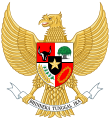
Back Organización territorial d'Indonesia AST Адміністрацыйны падзел Інданезіі Byelorussian Pembagèan Indonésia BEW Административно деление на Индонезия Bulgarian ইন্দোনেশিয়ার প্রশাসনিক বিভাগ Bengali/Bangla Administrativna podjela Indonezije BS Administrativní dělení Indonésie Czech Verwaltungsgliederung Indonesiens German Administra divido de Indonezio Esperanto Organización territorial de Indonesia Spanish
| This article is part of a series on |
| Subdivisions of Indonesia |
|---|
| Level 1 |
|
| Level 2 |
|
| Level 3 |
| (kecamatan, distrik, kapanewon, or kemantren) |
| Level 4 |
| (desa or kelurahan) |
| Others |
| This article is part of a series on the |
| Politics of Indonesia |
|---|
 |
Indonesia is divided into provinces (Indonesian: Provinsi). Provinces are made up of regencies (kabupaten) and cities (kota). Provinces, regencies, and cities have their own local governments and parliamentary bodies.
Since the enactment of Law Number 22 of 1999 on Local Government[1] (the law was revised by Law Number 32 of 2004, Law Number 23 of 2014, and the 2023 Omnibus Law on Job Creation),[2] local governments now play a greater role in administering their areas. Foreign policy, defence (including armed forces and national police), system of law, and monetary policy, however, remain the domain of the national government. Since 2005 as the enactment of Law Number 32 of 2004, heads of local government (governors, regents and mayors) have been directly elected by popular election.[3]
- ^ "DTE 46 / August 2000: What is regional autonomy?". Dte.gn.apc.org. Archived from the original on 31 December 2011. Retrieved 17 February 2012.
- ^ Undang-Undang Republik Indonesia Nomor 23 Tahun 2014 tentang Pemerintah Daerah (Law 23) (in Indonesian). House of Representatives. 2014.
- ^ Undang-Undang Republik Indonesia Nomor 32 Tahun 2004 tentang Pemerintah Daerah (Law 32) (in Indonesian). House of Representatives. 2004.